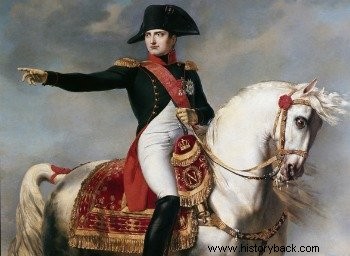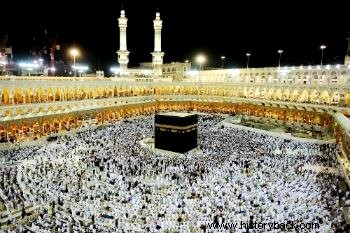Napoleon Bonaparte (1769-1821) was a military, political leader and Emperor of the French.
He instituted the Napoleonic Empire and conquered vast territory for France.
Biography

Napoleon Bonaparte portrayed as the leader who points the best way to his subjects
Bonaparte's rise to power was a direct consequence of the crisis in France at the end of the 18th century. At that time there was a search for a regime of political freedom and equal rights.
Napoleon was given the task of internally consolidating and externally disseminating some of the main achievements of the French Revolution (1789-1799).
The territorial expansion of the “Napoleonic Era” aimed to strengthen the French state. In this way liberal ideas were disseminated that weakened their opponents (generally monarchies) and created a large market for the country's products.
Napoleon Bonaparte was born in Ajaccio, capital of Corsica, an island recently acquired by France from the Republic of Genoa, on August 15, 1769.
Military and Political Career
He studied in Ajaccio and at the age of 10 he went to the military college in Brienne, France. In 1784, he entered as a fellow at the Royal Military School on the Champs de Mars in Paris, where he began his career. At the age of 16 he was graduated artillery warrant officer.
Faithful to the monarchy and military discipline, he initially took a stand against the French Revolution. However, he soon switched sides, joining the Jacobin Club, the most prominent political group in late 1791.
In 1794, the reaction of the moderates ended the group. Napoleon, despite the rank of brigadier general, obtained the previous year in the defense of Toulon, did not escape from prison, which lasted only fifteen days.
In 1795, he is appointed commander of the French army, when he defeats the revolting supporters of the monarchy. At that time he met Josefina Beauharnais, widow of a nobleman guillotined in the Revolution and mother of two children. They were married on March 9, 1796.
Two days later, he sets out on successful campaigns in Italy and Austria, returning to Paris cheered by the crowd. He then goes to Egypt (1798-1799), which is taken on a quick campaign.
He returns to Paris in 1799 and finds France threatened by civil war.
The Consulate (1799-1802)
Napoleon Bonaparte, acclaimed by the people as a national hero, on November 9, 1799, promoted the “Coup of the 18th of Brumaire” in a coup d'état.
On this date, he overthrew the Directory, dissolved the Assembly and took over the government. He implanted the Consulate regime and was named First Consul .
In 1800 he approved, in a plebiscite, a Constitution. In 1802, he signed the Peace of Amiens with England.
In this period he founded the Bank of France and organized his most relevant work:The Civil Code . Inspired by Roman law, this body of laws remains, in essence, in force to this day.
Victorious internally and externally, he is given the title of Consul-Forlife .
Read more about the Napoleonic Era.
Napoleon and the Empire
By referendum, Napoleon Bonaparte becomes Emperor, crowned by Pope Pius VII, on December 2, 1804. Becomes Napoleon I, Emperor of France .
Established by the Senate, in the name of the Republic, the Empire would be exercised with an iron fist. Napoleon instituted the Commercial Code and the Penal Code.
The internal balance achieved enabled Napoleon to put into practice his main plan:to make France the greatest power on the continent.
Several victories followed and gave the Emperor control of most of Central Europe.
To weaken England, Napoleon decreed the Continental Blockade, forcing European countries to close their ports to English trade.
This measure guaranteed French industry exclusivity in European markets. In 1807 and 1808, Bonaparte invaded first Spain and then Portugal.
With an army that seemed unbeatable, by 1810 almost all of western Europe was under his rule. The big exception was England.
That year, already separated from Josephine, he marries the Archduchess Maria Luísa of Austria, daughter of Francisco II and sister of D. Leopoldina - wife of D. Pedro I, and first empress of Brazil.
With the Archduchess Maria Luisa he would have a son, Napoleon II, who died at the age of 21.

Empress Maria Luisa and Emperor Napoleon present their son to the French court
Read more about the Napoleonic Empire.
War with the Russian Empire
In 1812, the Russians broke the blockade against England. In retaliation, Napoleon invaded Russia with an army of 600,000 men.
He arrives in Moscow and finds the city burned down by the Russians themselves. Your troops cannot withstand the harsh Russian winter. Defeated, he withdraws.
Only 30,000 of them manage to return to France. That same year, France was invaded and Napoleon ended up renouncing power in 1814, being exiled to the island of Elba, in the Mediterranean.
Hundred Days Government
In March 1815, Napoleon fled and entered Paris, cheered by the people and troops, outraged by the restoration of the Bourbon monarchy.
For a hundred days he reassumes power, but is again defeated, this time definitively, at the Battle of Waterloo, by the English and their allies.
The victorious nations, for their part, gather at the Congress of Vienna to redraw the European map.
He is then taken as a prisoner to the island of Saint Helena, off the African coast, where he died on May 5, 1821.
His remains are found in the Pantheon of the Invalides in Paris.
Learn more about the Napoleonic Wars.
Napoleon quotes
- Victory has more than a hundred fathers; defeat, on the other hand, is an orphan.
- Whoever fears defeat is sure of defeat.
- Every man fights more bravely for his interests than for his rights.
- Each hour of time lost in youth is one less possibility in future successes.
- A leader is a seller of hope.
Read more :
- French Revolution
- French Republic
- The Terror in the French Revolution
- Robespierre
- Independence of Haiti
- What is dictatorship?
